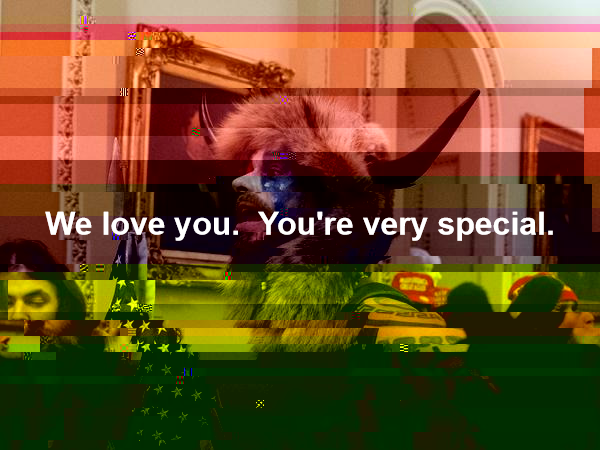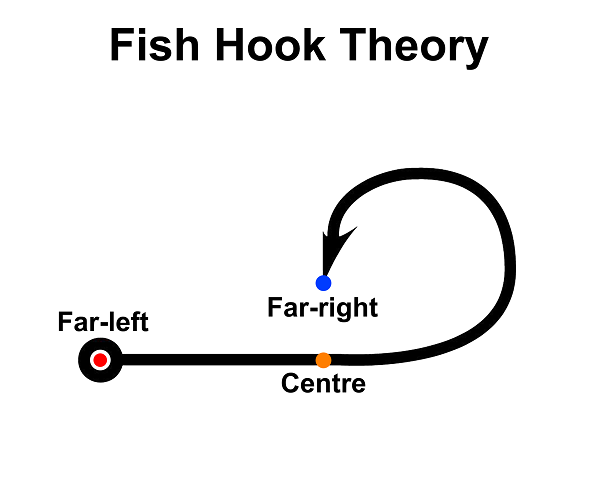On the Vape-Store Putsch (Time of Monsters AND Odd Columns #5)
Note: since writing this, I’ve taken up vaping. I’m as embarrassed by my own existence as you are to be caught reading this.
I’m not even apologizing for the glitch art this time. My brain feels like a smoking pile of broken machinery after this week.
By “that” I mean an attempted coup (or putsch? Neither one’s good, honestly) happened – it occurred as I was putting together a slate of book reviews, and honestly I didn’t have the bandwidth to really do anything about it. At the same time, one of my classes was cut and I’m staring down the barrel of a radically reduced wage this coming semester.
As a result, I haven’t had time to gather my thoughts.
Through the afternoon on Wednesday, Edgar and I ran our normal errands, picking up groceries for the coming week. We listened to NPR, getting updates as everything died down. Possibly the most surreal portion was when the president halfheartedly tried to quell the fury of the mob he’d incited: “Go home. We love you. You’re very special.”
“Go home. We love you. You’re very special.” — The President of the United States to a large crowd of domestic terrorists attacking a government building.
This is a farcical reworking of the concept of “oedi-politics” that I wrote about a few weeks ago. The president is casting himself in the role of the father trying to calm down a child mid-tantrum. The whole thing is a wholly inappropriate response to an event that saw militants, LARPers, and a guy wearing buffalo horns storming the Capitol building.
Now, to borrow a phrase that Edgar has repeated quite often: “there’s a lot to unpack here, but perhaps we should just set the suitcase on fire.”
What we saw both was a coup and was not. It was, in every legal sense, an attempt to overthrow an elected government by violence, and thus should be treated as deadly serious. In our non-legal analysis of it, though, I’m not sure that we can treat it as a serious attempt: not because it wasn’t dangerous, not because people didn’t suffer harm, not because there isn’t good reason to expect that there are most likely revelations of complicity from within capitol police (one of whom said “bet they like us now” in the course of failing to do his job properly), who killed a woman in 2013 for attempting a U-turn, but who decided, in regard to the insurrectionists, to just “let them do their thing.”
It cannot be analyzed (again, outside the framework of the law) as a serious coup because it was a spectacle. It was the image of a coup, enacted by people who didn’t know how to make that happen. It was a hyperreal coup. There was no real chance of them succeeding at their goals, because there were no demands, there was no plan beyond “storm the building.” There was no real infrastructure of protest or conflict, as left-wing groups tend to do in their various actions.
Or, if you prefer, a Simulacra of a coup.
This is part of why the claims that “Antifa” infiltrated the protest and spurred things on are laughable: not just because “Antifa” isn’t a group, but because this wasn’t anywhere near as sophisticated as the actions that various anti-fascist groups engage in. It was a brute-force human wave attack that was assisted by the defenses of the thing being attacked.
What worries me is that the people responsible now know that what they were doing is simply producing a spectacle. They have learned the gap between the image and reality, and they will try again, and next time they will make an attempt to bridge that gap. The next attempt will be more sophisticated, and they will continue until they are stopped or they win.
Simon & Schuster dropped his book, and he acted like he was being censored. Because he doesn’t actually know what the first amendment refers to. He thinks he’s entitled to your attention.
The other side, while largely incompetent, cannot be thought to be universally stupid or ignorant. If the problem was simply one of ignorance, then education could solve it – and Josh Hawley, who has made himself the lightning rod of hatred after this and is receiving some much-deserved blowback for it, is quite well-educated. We have to assume that there is a fair mixture of people who are ignorant(1) and bad actors.
Please, don’t misconstrue my implicit statement that “they should be stopped” as a call for violence. Nor, I stress, is it a condemnation of violence. The proper response to this is not to limit the toolkit in use, but to strategize. My personal feeling is that those among the other side who can be reached should be, and hopefully deradicalized: a human wave approach fails when fewer humans participate.
But what really needs to be emphasized here is this: 2015 is gone. You can no longer go back to the Obama-era normal – I don’t even find that desirable, but I know there are people out there who do. The possible outcomes of the current moment are generally bad: we can let the insurrectionist right pick the world we live in, we can let the centrist establishment pick the world we live in, or we can try to build a new world for ourselves. We don’t get to pick the outcome of the current moment: we can just try to bend the course of history in a direction that we choose.
The real problem with the left – and I’m far from the only person to say this, I know – is that half of us are horrified by what we saw on Wednesday, and half of us fantasized about doing the same thing but having a plan. Personally, I’m a bit closer to the former than the latter. While I have a great deal of distaste for politics as they are played in the United States, I am reconciled to being a political minority because I abhor state violence.
Part of this is ideological: I view the point of society as being to ensure some degree of flourishing for the greatest number of people, and violence is counter to that. Another part is simply practical: the capitol police aren’t about to open the doors up for Black Lives Matter or Marxists.
I keep seeing people reference horseshoe theory in my social media. This one feels a bit more accurate.
What the left needs to do is quit arguing about purity and tactics and focus on this deradicalization effort – which shouldn’t simply focus on the insurrectionist right but also on reactionary “centrists” who enable them. Minds need to be changed. The revolution that so many people await in a millennarian fashion, where they refuse to engage in the political process out of some misguided sense of purity, is never going to happen how those people think: it needs to be a revolution of consciousness-raising, of changing minds, before it can be anything else. This point will be resisted, because it sounds a lot like everyone coming to the table and talking things out – the neoliberal model of the marketplace of ideas – but I assert that it is not. What it needs to be as the immune response of a society that has yet to be born, helping those who could be a part of it resist fascism, which I am more and more coming to think of as a kind of mind-virus.
We need to change how we communicate our message, because a lot of very intelligent people are getting very hung up on communicating things with statistics and studies — which are very important! We should make sure that we are using the best information we can get! But people act based on feeling, and people don’t tend to feel statistics. The feel stories. Consider (while not considering who made it,) the movie Thank You For Smoking is a much better argument against lobbying than any number of studies, because people feel its message. It illustrates it for them.
I stand by my assertion that the United States is, at best, walking wounded towards its own dissolution, and at worst a zombie that doesn’t realize it’s dead. This doesn’t mean that we need to despair, though: a knot is destroyed by untying it. A pile is destroyed by arranging it. What we need now, more than anything else, is to continue the work of building strong and open-minded communities. Only then will we be safe from this kind of bullshit.
Terence McKenna during a panel discussion at the 1999 AllChemical Arts Conference, held at Kona, Hawaii, uploaded to Wikimedia commons by Jon Hanna and used under a CC BY-SA 3.0 license.
Of course, as a caveat, I would like to include a quote from Terence McKenna, who once wrote that “You don't want to become so open minded that the wind whistles between your ears.” I do not believe that the paradox of tolerance arises in good faith. In my mind, there is no slippery slope to fascism: it seems to me that no reasonable person could entertain the ideas put forth by these people, and those who argue that it should be entertained should be shunned as enablers.
That’s it, that’s the column. I don’t want to give these people any more of my brainpower while I’m supposed to be building my class.
1 — Please note: I’m intentionally drawing a distinction between “stupid” and “ignorant”. I don’t really believe in labeling large groups as stupid. Not even the supporters of the current president, honestly. They are, instead ignorant, in that they do not have access to good information. Some people are willfully ignorant – refusing access to better information and clinging to the status quo out of misguided investment. The best way, I feel, to sheer the ignorant – willful or otherwise — from the bad actors is to flood them with information.





